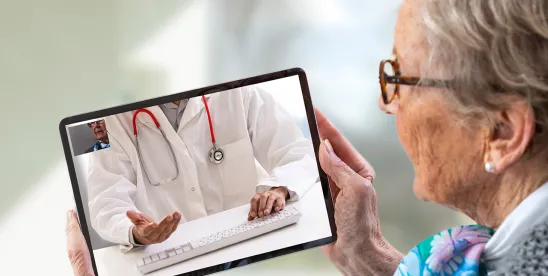HHS-OIG issued a new Special Fraud Alert on relationships with “purported telemedicine companies” on July 20, 2022. The Special Fraud Alert comes on the heels of a nationally coordinated takedown charging dozens of individuals criminally for their participation in an allegedly fraudulent scheme related to telemedicine, laboratories, and durable medical equipment (“DME”).[1] However, the alert comes after focus on telemedicine fraud cases in particular since 2019. The Special Fraud Alert identifies several characteristics of concern and common elements that individuals and companies should be aware of.
Scrutinized Arrangements and “Suspect Characteristics”
While recognizing the legitimate need for telehealth, the OIG has expressed concern regarding its potential exploitation. The OIG focused its attention on what it considers to be problematic arrangements where a telemedicine company solicits and recruits patients and then connects them with a provider to order or prescribe items and services, all with minimal (or no) direct interaction with the patient and without a thorough review of medical necessity. Moreover, the OIG focused on the degree of control exerted by the telemedicine companies, including their limiting or denying the providers an opportunity to review patients’ medical records and restricting the type of communication the provider has with the patients.
The OIG noted its longstanding concern related to arrangements that: (1) inappropriately increase cost to Federal health care programs for services lacking medical necessity; (2) cause potential harm to beneficiaries; or (3) corrupt medical decision making. The OIG, however, also issued an “illustrative” (but not comprehensive) list of suspect characteristics which the OIG notes “could suggest an arrangement that presents a heightened risk of fraud and abuse”:
-
Patients are recruited or identified by telemedicine company marketers using call centers and health fairs, or through advertisements on television, internet, or social media focusing on free or low out-of-pocket costs;
-
The ordering provider has limited contact with the patient or limited information from the patient to “meaningfully assess the medical necessity.” The OIG focused particularly on two aspects: (1) a telemedicine company requires the ordering provider to use audio-only technology; or (2) the telemedicine company provides the ordering provider with only “cursory patient demographic information or a medical history that may be a template”;
-
The ordering provider is compensated based on volume of items or services ordered or prescribed but characterized as the number of medical records reviewed;
-
The telemedicine company carves out commercial insurance and only furnishes items or services to Federal health care program beneficiaries;
-
The telemedicine company claims to only bill commercial insurance but may in fact bill Federal health care programs;
-
The telemedicine company only furnishes one product or single class of products;
-
Telemedicine company does not expect providers to follow up with patients or assist providers with the means to follow up.
Action Items and What to Potentially Expect
The telehealth, laboratory, and DME space will continue to be an area of focus and the interrelationship amongst these sectors will be closely reviewed by the Department of Justice (DOJ) and be a field for potential whistleblowers under the False Claims Act. Investigation by the DOJ may result in informal requests, subpoenas, or civil investigative demands or search warrants (see here for “What to Do When the Government Knocks On Your Lab’s Door”) while commercial payors may rely on data mining to review suspected cases of fraud.
Whether entering the space or currently in the space providing services, telemedicine companies, clinical laboratories, and DME companies should carefully review their relationships, business plans, and marketing efforts. This should be done even while there is a current public health emergency (“PHE”) waiver, as the PHE waiver does not absolve all concerns related to telehealth. As both Federal healthcare programs and commercial payors update their billing requirements, entities should carefully review and potentially modify their billing practices.
As the OIG noted, the “Special Fraud Alert is not intended to discourage legitimate telehealth arrangements” but to use caution. It is readily acknowledged that telehealth can be very beneficial for patients and providers alike. However, with any new area gaining rapid acceptance, the OIG has expressed concern with some aspects of these arrangements and is wary of the potential for fraud and abuse. As such, with specific notice by the OIG of suspect characteristics, entities should use this Alert as a guide for a privileged compliance review of operations, identify any risk areas, and consult legal counsel to address the proper avenues for modifying and moving forward.
FOOTNOTES
[1] Justice Department Charges Dozens for $1.2 Billion in Health Care Fraud, available at https://www.justice.gov/opa/pr/justice-department-charges-dozens-12-billion-health-care-fraud(July 20, 2022).



 />i
/>i

